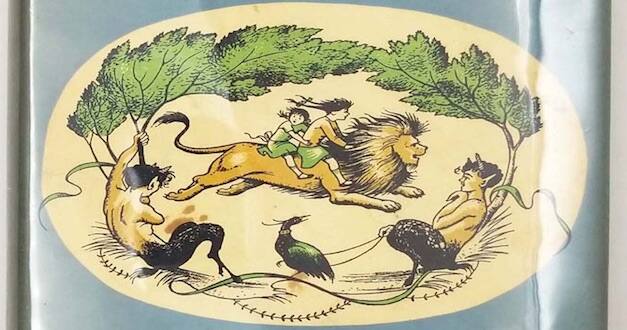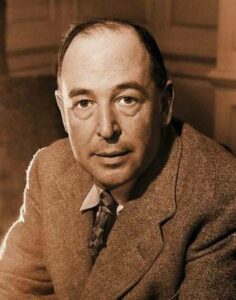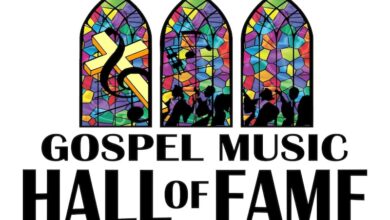How C.S. Lewis included political commentary in the Chronicles of Narnia

Did C.S. Lewis have a message beyond faith in The Chronicles of Narnia?
The last few months, I’ve been reading through Chronicles of Narnia with my daughters. It’s made bedtime reading a joy that I look forward to as much as they do.
Interestingly, throughout the series I noticed a good deal of political commentary slipped in by author C.S. Lewis. Most of the commentary is thematically anti-big government.
 Lewis is primarily known as a theologian and Narnia is primarily an allegory about the relationship between Jesus and his followers, but Lewis also wrote about politics, especially as it relates to Christian thinking, most famously in The Abolition of Man.
Lewis is primarily known as a theologian and Narnia is primarily an allegory about the relationship between Jesus and his followers, but Lewis also wrote about politics, especially as it relates to Christian thinking, most famously in The Abolition of Man.
I’ve compiled a list of eight of the best political commentaries I discovered while re-reading the Chronicles of Narnia. Some of these moments highlight the dark side of government. Other moments highlight what a better government would look like. And of course, there are a few lighthearted jabs at politicians.
Readers should note there will be some spoilers for the series below. I’ve tried to keep spoilers at a minimum, but some context is necessary for each piece of commentary to make sense. So if you want to read the series (which I highly recommend) without spoilers, turn back now.
For basic context, the stories chronicle the travels and adventures of various children who come from our world to the magical land of Narnia.
1. Government Done Well
At the end of the first book, The Lion, the Witch, and the Wardrobe, we catch a glimpse of the good reign of the four children (Peter, Susan, Edmund, and Lucy) as kings and queens of Narnia. Take a read for yourself.
“And they made good laws and kept the peace, and saved good trees from being unnecessarily cut down, and liberated young dwarfs and young satyrs from being sent to school, and generally stopped busybodies and interferers and encouraged ordinary people who wanted to live and let live. And they drove back the fierce giants … on the North of Narnia when these ventured across the frontier. And they entered into friendship and alliance with countries beyond the sea.”
It’s a government so good it could only be in fantasy. Peace is at the center of the reign. Conflict is only taken in defense.
Respect for nature is common with Lewis, but readers should be careful not to take a radical environmentalist message with the talk of protecting trees, because the good trees in Narnia are sentient persons.
Lewis is a constant critic of traditional schooling and its dulling effect on children, so the bit about liberating the young is both funny and refreshing. Lastly, the penchant against busybodies and interferers highlights a key source of bad policy.
2. The Dark Side of Bureaucracy and Technocracy
In the third book, The Voyage of the Dawn Treader, King Caspian of Narnia returns to one of Narnia’s islands after a long absence. What he finds is layers of bureaucratic red tape perpetuating evil.
Upon Caspian’s arrival to the island, the “governor” of the island tries to put him off by saying, “no interviews without appointments except nine and ten p.m. on second Saturdays.” Lewis’s scorn for arbitrary accountability shields drips off the page.
But Caspian ignores this and cuts to the chase. The governor is supporting the slave trade against the ancient customs of Narnia. When asked why, the governor says it’s an unavoidable economic necessity.
“Your majesty’s tender years hardly make it possible that you should understand the economic problem involved. I have statistics, I have graphs, I have—”.
Caspian isn’t concerned about the statistics or graphs, and he isn’t interested in “moving that a commission of inquiry be set up.” When Governor Gumpas says he can’t be party to this affront to “progress and development,” Caspian fires him on the spot.
3. The Worst Get on Top
The fourth Narnia book, The Silver Chair, ends with the best joke of the series. My daughters couldn’t understand why I laughed so hard. In the book, our main characters confront school bullies in our world accompanied by the creator of Narnia (a lion named Aslan). The school principal (referred to as “The Head”) who enables the bullies happens to enter the scene, see Aslan, and call the police. Listen to what happens next.
“When the police arrived and found no lion … and the Head behaving like a lunatic, there was an inquiry into the whole thing. And in the inquiry all sorts of things about [the school] came out, and about ten people got expelled. After that, the Head’s friends saw that the Head was no use as a Head, so they got her made an Inspector to interfere with other Heads. And when they found she wasn’t much good even at that, they got her into Parliament where she lived happily ever after.”
The Head, like many politicians, fails her way up.
4. Lust to Rule is the World-killer
In the sixth book, a prequel titled The Magician’s Nephew, characters Digory and Polly explore many different worlds. One of the worlds they explore, Charn, has met a dismal fate. All life in the world has been destroyed except that of one sleeping queen named Jadis. Once awakened, she explains what happened.
Jadis discovered a magic word that, once uttered, would kill everything on the planet except her. When Jadis’s sister was about to overthrow her, she uttered the word and killed all life in order to hold onto her rule.
Digory and Polly are horrified and ask how she could do that to all the innocent, ordinary people. Queen Jadis has a telling answer,
“I was the queen. They were all my people. What else were they there for but to do my will. I had forgotten that you are only a common boy. How should you understand the reasons of State? You must learn, child, that what would be wrong for you or for any of the common people is not wrong in a great Queen such as I. The weight of the world is on our shoulders. We must be freed from all rules. Ours is a high and lonely destiny.”
This evil mindset is not confined to Charn. Aslan warns Digory and Polly later in the book,
“It is not certain that some wicked one of your race will not find out a secret as evil as the Deplorable Word and use it to destroy all living things. And soon, very soon, before you are an old man and an old woman, great nations in your world will be ruled by tyrants who care no more for joy and justice and mercy than the Empress Jadis.”
The Magician’s Nephew was published in 1955 and is set at the beginning of the 20th century. It’s no leap to say this is a warning about the evil regimes of Nazi Germany and Soviet Russia, and the world-killing possibility of nuclear war. Lewis, a British World War I veteran, seems particularly aware of the existential threat of war to humanity.
5. Tyrannical Government’s Incentive to Erase History
In Prince Caspian, invaders rule Narnia. King Miraz is a usurper determined to keep the throne from the true heir, the young Caspian. The only friend of Caspian seems to be his nurse, who tells him tales of the old Narnia. One day Caspian makes the mistake of saying to Miraz that he wished he lived in the old Narnia with talking animals, Aslan, and the old rulers of Narnia.
Miraz responds, “Never let me catch you talking—or thinking either—about all those silly stories again. There never were those Kings and Queens. How could there be two Kings and Queens at the same time? And there’s no such person as Aslan. And there’s no such things as lions. And there never was a time when animals could talk. Do you hear?”
After Miraz discovers the nurse has been teaching Caspian the true history of Narnia, she disappears.
6. A Portrait of a True Leader
Lewis gives us another picture of what a better government would look like later in the book. In a word, it’s characterized by humility. Aslan asks Caspian if he feels sufficient to be King. Caspian responds, “I–I don’t think I do sir. I’m only a kid.” To which Aslan responds, “Good. If you had felt yourself sufficient, it would have been proof that you were not.”
Our world would be a much better place if our leaders believed themselves insufficient. A good friend of Lewis, J.R.R. Tolkein, had a similar insight in saying, “the most improper job of any man, even saints (who at any rate were at least unwilling to take it on), is bossing other men. Not one in a million is fit for it, and least of all those who seek the opportunity.”
7. How Tyrants Manipulate Language
In the final book, The Last Battle, Narnia is again dealing with invaders, this time aided by quislings within. A talking ape named Shift is selling his fellow Narnians into slavery. An old Bear challenges him. “We don’t want to do all those things. We want to be free.” The conniving ape replies, “What do you know about freedom? You think freedom means doing what you like. Well, you’re wrong. That isn’t true freedom. True freedom means doing what I tell you.”
Beware when someone in authority tells you a word means something different, or especially the opposite of what it has always meant. A desire to control likely underlies the change.
8. Government’s Attempt to Level All Competing Sources of Truth
We’re not done discussing the loathsome Shift. The way he has succeeded at convincing his fellow Narnians to listen to his orders is by creating a fake Aslan using a lion skin. Shift says it’s Aslan’s will that they be sold to the neighboring country, Calormen. But some wise animals who know about the real Aslan question Shift.
A lamb replies, “What have we to do with the Calormenes? … They have a god called Tash. They say he has four arms and the head of a vulture. They kill men on his altar. I don’t believe there’s any such person as Tash. But, if there was, how could Aslan be friends with him?”
Shift replies, “What do you understand of such things? Tash is only another name for Aslan. All that old idea of us being right and the Calormenes wrong is silly. We know better now. The Calormenes use different words but we all mean the same thing. Tash and Aslan are only two different names for you know Who.”
Shift needs to deny the uniqueness and importance of Aslan. Instead, he declares everyone is right about what the truth is. But why? Well if everyone is right about who Aslan is, then no one is.
The lamb is right that Aslan would never be a friend to a god who asks for human sacrifices. This source of authority is competition for Shift. If Narnians accept Aslan as the ultimate authority, they cannot accept Shift’s authority. So Shift attempts to rob Narnians of the truth by claiming everyone is correct. From then on he refers to his false amalgamation of gods with the neologism “Tashlan”.
This sly move is not one of fiction. Authoritarian regimes including Nazi Germany, Soviet Russia, and Communist China frequently try to use the force of the state to change or destroy churches. There can be no competing sources of truth if authoritarian regimes wish to succeed.
See for Yourself
I encourage everyone to read the Chronicles of Narnia for themselves. They’re perfect books for all ages. For children, Narnia introduced a captivating fantasy land full of adventure and freedom.
But the further in you go, the bigger everything gets. Older readers will find themselves grappling with themes much bigger than they expected. It’s a wonderful series for parents wanting to read to children for this exact reason.
And you can do much worse than an author with the wit and wisdom that Lewis displays about politics and life in general.
–PeterJacobsen | Foundation for Economic Education






